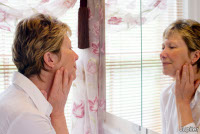Bathroom Safety Makeovers
 (ARA) – The bathroom may seem innocent enough, but it can be more of an obstacle than a convenience for some elderly folk. What can you do to make the bath a safer, easier place to visit?
(ARA) – The bathroom may seem innocent enough, but it can be more of an obstacle than a convenience for some elderly folk. What can you do to make the bath a safer, easier place to visit?
A lot, according to Lisa Bauer of the Medline Industries Interiors Division, which employs a team of designers who work with a number of long-term care facilities every day to make them more functional, safer and aesthetically appealing.
‘Think of it as ‘Extreme Makeover: Senior Safety Edition,” says Bauer. ‘By considering the needs of the elderly, you can easily make a few changes that can dramatically affect the ease-of-use and safety for loved ones.’
Bauer points to a report in the journal ‘Nursing Home’ for some tips consumers should follow if they are remodeling with an elder relative in mind.
Consider a color other than white
‘A sparkling, white bathroom may make you think of cleanliness, but white can be a problematic color for some seniors. As we age, our eyes lose their ability to discriminate color well,’ says Bauer.
Some older folks might have trouble locating a white toilet seat if the flooring is also light or white. Men might have trouble voiding into a toilet while standing if they have difficulty identifying where the toilet stops and the flooring begins.
Provide something for them to hold onto
Toilets should have plenty of space around them, so that an aide could stand on either side and assist an elder. Angled grab bars are preferable to standard horizontal grab bars, which are typically shorter and require the user to have more upper body strength. With angled grab bars, seniors can grasp the bar at a lower position and then move up the bar, which can also increase transfer independence.
Create traction where it might get wet
The National Institute on Aging suggests placing non-skid mats, strips or carpet on all bathroom surfaces that could possibly get wet. Don’t skimp in this area — environmental hazards, such as wet floors, account for 16 to 27 percent of falls in nursing homes, according to the National Center for Health Statistics.
Raise the seat
OSHA recommends nursing homes use toilet seat risers for independent seniors as well as partially weight-bearing residents who are cooperative, can sit up unaided, have upper body strength and are able to bend their hips, knees and ankles.
Bath boards and benches
‘Older folks with mobility issues often have trouble getting in and out of the shower. Bath boards and benches can help,’ says Bauer.
Placing clothing or material between the user’s skin and the board can help reduce friction and skin tears, OSHA suggests. For added comfort, choose models with padded seats or back support.
Universally accessible sinks
Making bathroom sinks accessible to all helps elders remain independent in their grooming. Wheelchair users can easily access sinks that have space under the bowl or that are accessible from the side. While you’re at it, you might want to take a look at the faucets on your sinks.
‘Single-control faucets can prove problematic for elders with poor grasping ability. Instead, choose blade handles,’ comments Bauer. ‘Adjustments should also be made so that people in wheelchairs can see the mirrors placed above bathroom sinks.’
Doors
‘Barn-style’ doors with exterior tracks or ‘pocket doors’ that slide into wall pockets are becoming increasingly popular in long-term care facilities. If it’s in the budget, you can incorporate them into your home bath to make the room easier to access. These types of doors frequently have hardware that is easier to use for people with poor grasping ability. Another reason to consider these styles of doors is that having two or more traditional doors swinging into a single space has been shown to increase falls.
To learn more about equipment and accessories that can help make the bathroom safer for seniors, visit www.medline.com.
Courtesy of ARAcontent
